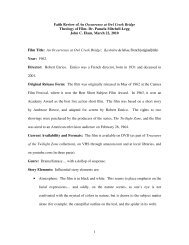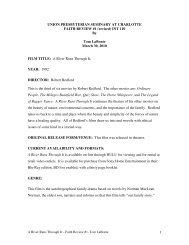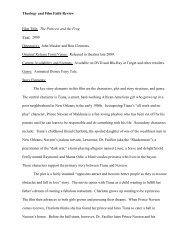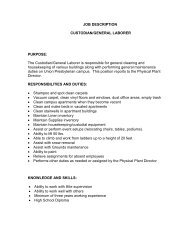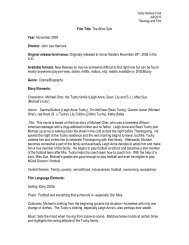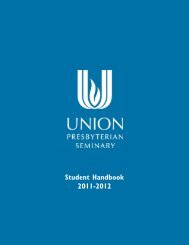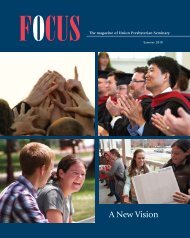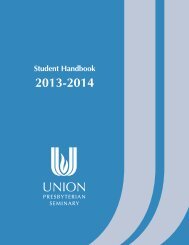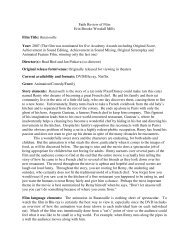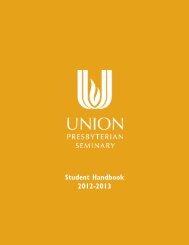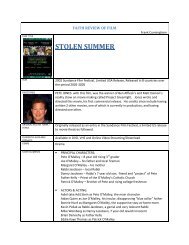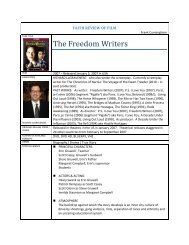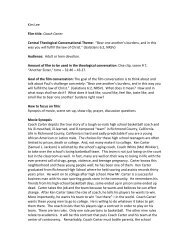Academic Catalog 2010-2011 - Union Presbyterian Seminary
Academic Catalog 2010-2011 - Union Presbyterian Seminary
Academic Catalog 2010-2011 - Union Presbyterian Seminary
You also want an ePaper? Increase the reach of your titles
YUMPU automatically turns print PDFs into web optimized ePapers that Google loves.
<strong>Union</strong> <strong>Presbyterian</strong> <strong>Seminary</strong> <strong>Academic</strong> <strong>Catalog</strong> <strong>2010</strong>-<strong>2011</strong>For information about the Educator Certification Initiative at <strong>Union</strong> <strong>Presbyterian</strong> <strong>Seminary</strong>, which offerscourses through the ECP for church educators seeking certification in the <strong>Presbyterian</strong> Church (U.S.A.),visit www.upsem.edu/prospective/ecp/eci/index.html.PROGRAMSThree ECP terms will be offered in <strong>2010</strong>-<strong>2011</strong>: fall, spring, and summer. The fall term begins with nine weeks ofstudy at home starting in October, continues with a 6-day period of classes on the Richmond campus in January,and may include submission of a final project or paper. The spring term begins with study at home for a nineweekperiod from April to June, continues with classes on the Richmond campus for a 6-day period in June, andmay include submission of a final project or paper. The summer intensive term begins with four weeks of studyat home in July, continues with classes on the Richmond campus for a 5-day period in early August, and mayinclude submission of a final project or paper. Attendance at all class sessions of the on-campus periods inJanuary, June, and August is required of all students enrolled in classes each term.During the at-home study segment, students complete assignments according to the course syllabus. During thesession on campus, students attend approximately three hours of class per course each day. There is time forfellowship with other ECP students, for use of the library, and for worship. Following the on-campus session,students may complete a final paper or project linking course work with the student’s home ministry if requiredby their professors. If available, housing for students attending the on-campus session will be provided on campus.Students who complete courses in the ECP receive graduate credit. Most courses earn one credit equivalent tothree semester hours. ECP courses may not be audited.ECP students apply and are admitted in the same fashion as other M.A.C.E. students, following the proceduresspecified for this program. To ensure completion of the admissions process in time to start the ECP program,the following deadlines must be observed.March 1 for the ECP spring session;May 1 for the ECP summer intensive session;September 1 for the ECP fall session.A list of ECP tentative course offerings is available at www.upsem.edu/Current_Students/ecp1/registrar/glance.html.See chapter 6 for admission procedures. ECP students are not eligible for institutional financial aid (see chapter 7).Master of Divinity (M.Div.)The church calls for seminaries to train a new generation of visionary leaders who are thoroughly steeped inscripture and the theological traditions of historical Christianity and are prepared to interpret contemporarythought and life. Such leaders must be able to model and inspire the deepest levels of Christian commitmentwhile leading increasingly complex organizations.• Students come to seminary in search of knowledge, skills for ministry, and a profound experience incommunity of the gospel’s liberating power.• The <strong>Union</strong> <strong>Presbyterian</strong> <strong>Seminary</strong> faculty affirms with the church that a genuine vocation to Christianservice and a passion for the gospel lie at the base of all faithful ministry, while recognizing that the localcongregation continues to be the primary context for which graduates of the Master of Divinity programare being prepared.GoalsIn order to be faithful to our particular vision of theological education for the 21st century and to honor currentstandards of the Association of Theological Schools in the United States and Canada, the <strong>Union</strong> <strong>Presbyterian</strong><strong>Seminary</strong> faculty has adopted the following goals, divided into four emphases, for the Master of Divinity degreeprogram.2-4



